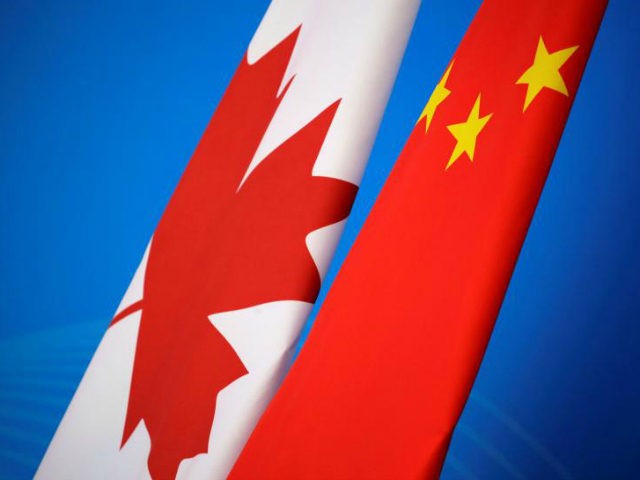The Dalian Intermediate People’s Court in China’s Liaoning Province sentenced Canadian Robert Lloyd Schellenberg to death on Monday.
Canadian Prime Minister Justin Trudeau immediately condemned the sentence as “arbitrary” and said the Schellenberg case is “of extreme concern to us as a government.” Many observers speculated the swift and severe judgment is related to China’s ongoing dispute with Canada over the arrest of Huawei executive Meng Wanzhou.
Schellenberg, reportedly 36 years old, was arrested in China in 2014 and accused of participating in an operation to smuggle 222 kilograms of methamphetamine from Dalian to Australia. He was given a 15-year prison sentence in 2016. His appeal of that sentence led to the retrial in which he was just sentenced to death.
The Associated Press noted the appeals court suddenly sided with prosecutors last month and declared Schellenberg’s original 15-year sentence was too lenient, scheduling a retrial with only four days’ notice. The equally sudden interest of Chinese media in publicizing the case fueled suspicions that Schellenberg has become a pawn in China’s bid to secure the release of Wanzhou, who was arrested in Vancouver in December at the request of the U.S. government.
Wanzhou is out on bail while a Canadian court considers the U.S. request for extradition to face charges of financial fraud and evading U.S. sanctions on Iran.
Schellenberg’s Chinese lawyer Zhang Dongshuo described the court action as unusual, insisting that prosecutors have not introduced enough evidence to establish his client’s guilt on the original charges, let alone escalate to the death penalty. Schellenberg claimed during his original trial that he was an innocent tourist framed by a criminal gang.
Zhang refused to state whether he believes Schellenberg’s treatment is linked to the Meng case. Others were not so reticent to state their belief, as related by CTV News:
Ben Rowswell, a former Canadian diplomat who now heads up the Canadian International Council foreign policy think tank, said he considered the death penalty to be “a really dangerous escalation” of hostilities from China.
“In the absence of any messages from the Chinese government that they’re willing to protect the judicial process and have judicial issues dealt with separately from political issues, it certainly leads us to interpret this as yet another escalation,” he told CTV News Channel on Monday.
[…]
Rowswell said Schellenberg’s fate would be “on the top of the agenda” for diplomats from Trudeau on down, with Canadian officials likely attempting to have Schellenberg returned to Canada and his case dealt with under the Canadian justice system.
“They will be doing everything possible in closed, secret, diplomatic channels to try and reach a resolution,” he said.
Lynette Ong, a professor at the University of Toronto’s Asian Institute and Munk School of Global Affairs, said the Canadian effort would likely involve convincing China that its world standing would be hurt if it executed Schellenberg.
Speaking on CTV News Channel, Ong said China needs to be seen as a “benign power” in order to realize its goal of becoming a greater global power.
“We need to persuade the Chinese that it is actually not in their national interest to detain Canadians or any foreigners as pawns,” she said.
Ong added that if Schellenberg becomes the first Canadian executed by China, it will “push Canadians over the edge” and damage relations between the two countries for years to come.
Former Canadian ambassador to China Guy Saint-Jacques told CBC News China clearly applied its penal code against Schellenberg with “more zeal than they would have otherwise” due to tensions over Meng.
“The other thing that I think has to be noticed is the fact that they invited foreign journalists to attend the trial. They claimed that it’s for transparency purposes. Well, if that is the case, they could have started doing that years ago. I think all this was orchestrated,” Saint-Jacques said.
Law professor Margaret Lewis of Seton Hall University made a similar point to the New York Times:
The procedures in Mr. Schellenberg’s case would be unusual even if he was a Chinese national. The fact that he is a Canadian, combined with the welcoming of foreign media to view court proceedings, makes it downright suspicious.
“The fact that Mr. Schellenberg did not get the normal two year suspension of execution pending good behavior in prison typically extended in such cases enhances the urgency of the matter for Canada,” Charles Burton of Ontario’s Brock University, a former Canadian diplomat with experience in Beijing, told the Washington Post.
Burton implied creating a sense of urgency is the point of the exercise, as China wishes to “exert pressure on the Canadian authorities” to drop the case against Meng Wanzhou.
William Nee of Amnesty International said the “rushed nature of the retrial” and “deliberate way in which Chinese authorities drew attention to this case” made the death sentence “shocking,” even though China has executed foreigners convicted of drug smuggling in the past.
“China is going to face lots of questions about why this particular person, of this particular nationality, had to be re-tried at this particular time,” predicted China director Sophie Richardson of Human Rights Watch.
“It is of extreme concern to us as a government, as it should be to all our international friends and allies, that China has chosen to arbitrarily apply [the] death penalty,” Canadian Prime Minister Justin Trudeau said on Monday, in perhaps his strongest statement against China since Meng Wanzhou’s arrest.
“Worst-case fear confirmed,” Schellenberg’s aunt Lauri Nelson-Jones told Canada’s National Post on Monday.
“Our thoughts are with Robert at this time. It is rather unimaginable what he must be feeling and thinking. It is a horrific, unfortunate, heartbreaking situation,” Nelson-Jones said.

COMMENTS
Please let us know if you're having issues with commenting.